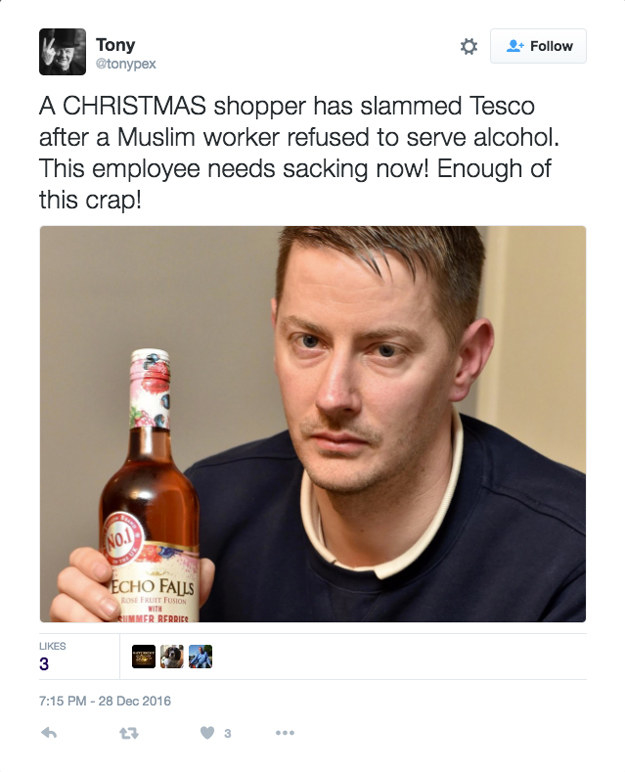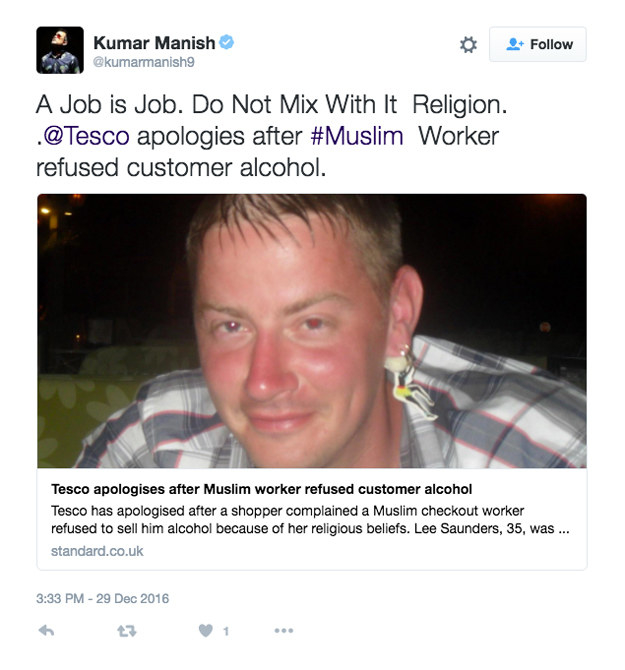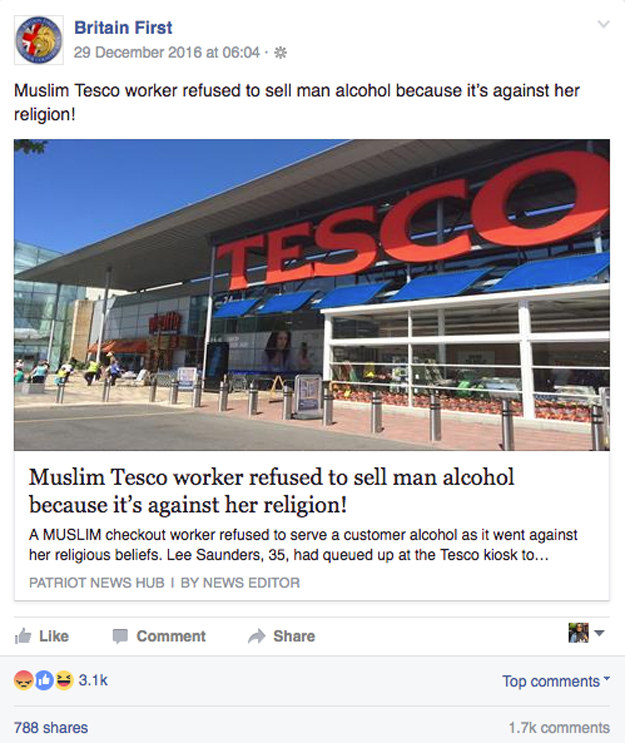Over Christmas a story about a Muslim checkout worker refusing to serve a customer alcohol was covered widely. You may have seen it.

The story was about how Lee Saunders, 35, was refused sale of a £4 bottle of wine by a Muslim worker at Tesco in the London suburb of Feltham, due to her "religious beliefs".




People shared the story well into the new year – the Mail Online website shows it was shared over 17,000 times – while hundreds of comments were left on news sites where the report of the incident had been published:



People directly addressed the supermarket giant on Twitter.


Even high-profile figures tweeted about it.

Just two weeks earlier the author Hanif Kureishi said it had happened to him.

But how did this local story end up making national headlines? Tell MAMA, an organisation that monitors anti-Muslim hate and drew attention to the way in which the story was covered, analysed the story's progress in an article entitled "How Stories About Muslim Cashiers Refusing To Sell Alcohol Go Viral".
Tell MAMA pointed out that the story had first appeared online two weeks after the incident, that the headlines were more sensationalised than the reporting in the articles, and that the customers' comments were directed at the supermarket and not the sales assistant.
It noted how The Sun reported that the customer said: “I was a bit miffed and baffled by it."
The Sun also went on to quote the customer as saying: "It should have been made clear if they can’t serve you certain items. There were no warnings or signs. She apologised afterwards, but she’s been put in that position. It’s not entirely her fault to be fair."
In fact, BuzzFeed News has learned, the member of staff had been working at a kiosk where customers did not usually go to purchase alcohol, and would tap a colleague on the shoulder to assist if they did.
At the time, Tesco said in a statement: “We take a pragmatic approach if a colleague raises concerns about a job they have been asked to do. We have apologised to our customer for any inconvenience caused on this occasion.”
The supermarket, like all large employers, would follow recent guidance published by the Equality and Human Rights Commission, the national equality body, in dealing with employee requests on religious grounds, according to Yeing-Lang Chong, a partner at employment lawyers Springhouse, who says she has seen many recent discrimination cases.
"It's not a question of upsetting customers," Chong said. "Yes, coming in to the run-up to Christmas there will be an apology simply for publicity reasons, but if an employer were to treat the employee in a different manner and suddenly imposes sanctions on them, discipline them – particularly if the individual is from a particular religion – that would be unfavourable and discriminatory."
So the story was relatively unremarkable – but as Tell MAMA has pointed out, it picked up steam on far-right networks:
The popularity of news articles about Muslim cashiers refusing to serve customers buying alcohol is no accident. Part of the success owes to sensational headlines. And to the insular online networks built on the narratives of anti-Muslim ideologues and the far-right which help these stories find a larger audience.
This was made clear when the far-right group Britain First shared a version of the story on its Facebook page, which garnered around 800 shares and 1,700 comments.

This is not the first time this type of story has gone viral. A very basic search on Nexis, the online news archive, brings up a thousand results for "Muslim cashier refuses to sell alcohol".
Whittled down to just UK publications over the past five years, over 200 results for the search come up.
However, on closer inspection the hundreds of articles and column inches during this time frame in the UK are dedicated to just three known separate incidents, including the recent one in December 2016.
Here's the first reported instance in December 2013:


Just some of the headlines from an incident in December 2013 include: "Customer anger at M&S Muslim code" in the Daily Telegraph, "M&S sorry as Muslim refuses to sell alcohol" in the Yorkshire Post, and "Not just any U-turn, this is a M&S U-turn: Now chain apologises after Muslim check-out girl refused to sell alcohol to customer" on Mail Online.
In a statement provided to the Telegraph at the time, Marks and Spencer apologised before adding: “Where we have an employee whose religious beliefs restrict food or drink they can handle, we work closely with our member of staff to place them in suitable role, such as in our clothing department or bakery in foods.
“We regret that in the case highlighted today we were not following our own internal policy.”
There was a similar story in July 2014:

Although such incidents have taken place, Iman Abou Atta, the director of Tell MAMA, told BuzzFeed News that media coverage has blown it out of proportion: “There has been no major issue in the UK around Muslims not selling alcohol. Those that work in retail know that they may have to sell products as part of the job and those that do not want to, do not apply for such roles.
"Some Muslims take the position that they are not ingesting the material and hence can handle it. Others do not want to handle it and Muslims, like any other community, make common-sense decisions based on their requirements."
Atta said the amount of coverage was not really fair. "Newspaper stories amplifying this element show that it must have been a poor news day when stories were short."
Miqdaad Versi, a campaigner for accurate reporting about Muslims in the press, who has forced a number of corrections from national newspapers, said: "Linking any story to the 'Muslims are bad' narrative leads to more clicks and more money as sensationalism sells."
